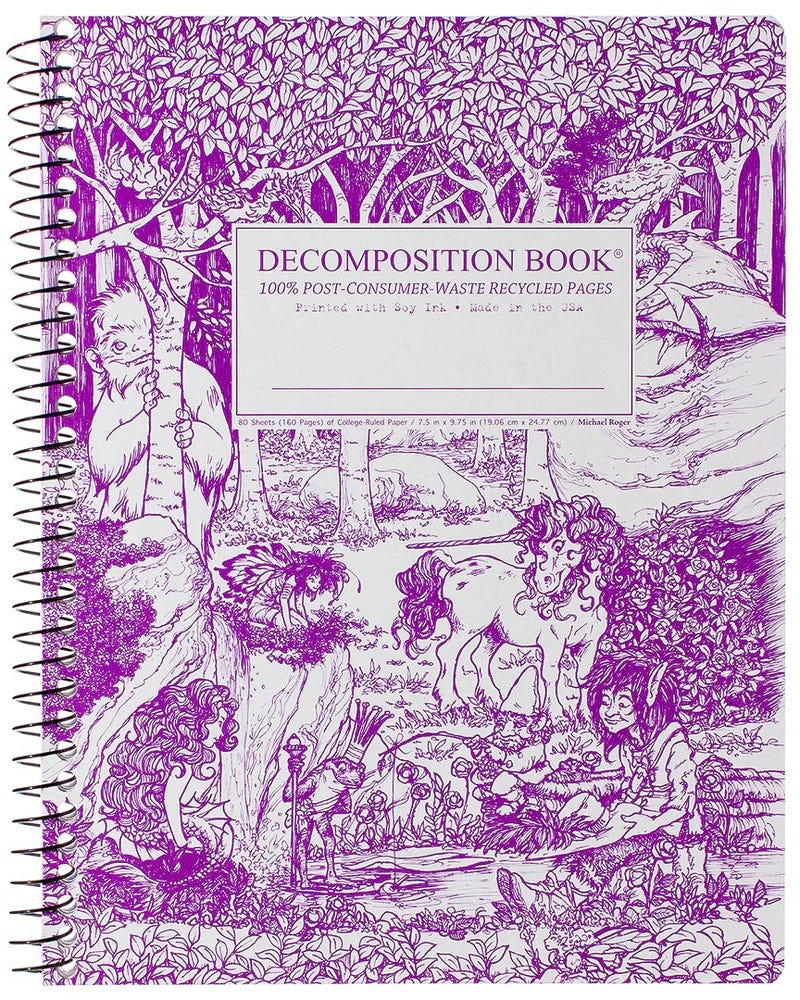High Five With Carla Fernandez
The author of Renegade Grief on five (or six!) of her current obsessions.
Each month, I ask an author I love to share five recommendations they have for other writers, whatever is the wind beneath their wings when they sit down to write. This month I reached out to Carla Fernandez, the author of Renegade Grief: A Guide to The Wild Ride of Life After Loss, on sale March 11 (next week!) and available now for preorder.
Carla Fernandez’s work focuses on collective care and how to change culture around grief. She is the cofounder of The Dinner Party, a national network of peer-support circles for young adult grievers, featured in The New York Times, NPR, Oprah Daily, and cited in multiple books.
In addition to her work in grief, Carla partners with a range of clients through her community design studio as an impact strategist and facilitator, particularly on initiatives related to climate change, democracy, and the arts.
Carla is a senior fellow with USC’s Annenberg School Innovation Lab and a Catherine B. Reynolds Foundation Scholar in Social Entrepreneurship at NYU. She divides her time between the Hudson Valley and Joshua Tree. Visit her website or find her on Instagram at @carlitafernandez.
So without further ado I’m handing the metaphorical microphone over to Carla!
Vassar College Libraries: To break up the long, steady, switchbacking that is writing a book, I found it really helpful to have different outposts where I could post up. I spent some good hours at the Rose Reading Room in the New York Public Library, and the Center for Fiction in Brooklyn, but the most special of them all was the library at Vassar College in Poughkeepsie, New York. It’s about 45 minutes from where I live in the foothills of the Catskill Mountains, which meant that if I made the trek there, I better make a legitimate dent in my word count, research, or editing. It’s open to the public, but I ended up getting a Visiting Scholar pass, so I could check out books and mostly just feel the glow of being a card-carrying member of the gothic library club. I particularly liked to sit under this beautiful stained glass window that features Elena Cornaro Piscopia, a 17th century Venetian scholar and one of the first women to receive an academic degree from a University. She became one of the Renegade Grief patron saints. In the stretches of book writing that felt slow or sloggy, I found it useful to vampire off the energy of 18 year olds cramming for finals seasons by just sitting in their general presence. 10/10 recommend.

The Rose Reading Room, as featured in The New Yorker! Travel Monitor: This is so dorky, but I really need space to spread out my digital self, and I couldn’t lug my big, double monitor to the Vassar Library. I also travel about half of the year for life and work, and needed a way to see the various different tools I was using to write without having to annoyingly swap between tabs and windows. Whether I was editing in Word, and referencing research in a PDF, or transcribing an interview in Otter, and mapping sections out in Scrivener, I like to be able to see multiple windows simultaneously. To solve for the claustrophobia of a small laptop screen, I got a cheap and portable monitor that I think is mostly marketed to gamers, but really does something for my brain when I’m working from a library, a hotel room, or somewhere else on the road. Major unlock.
Dr. Singha’s in the Bath: The other place I ended up doing a surprising amount of work was in the bath, or otherwise submerged in water. Hot tubs, hotel pools, bath-tubs, lakes, wherever I could find a place to soak, I went for it. By getting out of the cubicle energy of staring into a computer screen (or two), and letting my body float, I would inevitably find myself reaching for my Notes app to write down ideas, phrases, connections, or edits that I would clean up and drop in the next day. Most of the time, I thought I was “done” for the day, but there’s something about the softening of the gaze that can happen in the bath, that allowed me to see some peripheral perspectives that really mattered. This got even more true when my friends Sean and Shaina Walker turned me onto Dr. Singhas, this mustard bath salt, which has a similar and glorious effect to taking a Xanax, leaves your body tingling, and was a real writer’s-little-helper.
The Case for the Cheap Journals: I’m a big fan of a high-end journal (Moleskine, XL, hard cover, either in grid of dots, never lines! Or more recently, a bright blue Fabriano from a trip to Milan scratches the itch, too.) But I learned that there were times in the book writing process where the preciousness of a luxury notebook got in the way of generating ideas, making connections, and the parts of writing that require us to not be so uptight. For those phases of the project, I loved to get the most ridiculous, cheap, always spiral-bound notebook, I could find. I did some really excellent work in this Decomposition Fairytale Forest edition, with a unicorn on the cover, and their edition covered in cartoon gardening gnomes came in clutch, too. Writing a book felt like being both a homeschool teacher, and the student. Finding ways to defang a scary part of the process (Oh god, new chapter, where do I begin this one? What am I trying to say?) became less so when it was me, a cup of coffee, and a spiral bound notebook seemingly made for children or adults who don’t take themselves too seriously. Sometimes I would write a single phrase on a page or the name of someone I wanted to interview or a book I wanted to revisit in a large scrawl, and then without guilt, flip to the next. The paradox of approaching writing - even about grief - like playing with toys, not just hard work, allowed my inner critic to take a backseat and let the development actually happen. You might read my book and find a passage that has the faint fragrance of a unicorn journal, and I would be very delighted with that.
DIY Peer Support Circles: I’m a huge proponent of the power of peer support - and the importance of complementing professional relationships and tools with companionship from people who are going through what you’re going through, and want to talk about it. It applies to times of grief and loss, and is the core premise of The Dinner Party; and it’s what I reached for when taking the leap off the debut-author cliff. I was very lucky to be a part of two different circles that were game changers for me. The first one was for the book writing phase. I set it up with four friends who were also first-time, non-fiction writers and entrepreneurs actively juggling book demands with running some kind of business. We shared notes about writing practices, timeline questions, cover design drama, editing quandaries, motivation, memes and the general day-to-day ups and downs of figuring out our first books along similar timelines. Here we are on an in-person retreat in Joshua Tree, and here are their gorgeous, gorgeous, books: Alua Arthur, Briefly Perfectly Human; Liz Tran, The Karma of Success; Scott Shigeoka, Seek; Arianne Edmonds, We Now Belong To Ourselves (not pictured). The other circle is one that this incredibly hot and smart woman named Ruthie Ackerman started for the book launch phase; we’re a group of authors with 2025 releases, and we meet every other week and chatter regularly in a WhatsApp group to cheer each other on, share resources and ideas, and generally make the wildly vulnerable and isolating experience of ripping your heart out of your chest and placing it on a public bookshelf much more bearable. Check out those 2025 reads, including: Ruthie Ackerman, The Mother Code; Nicole Graev Lipson, Mothers and Other Fictional Characters; Nancy Reddy, The Good Mother Myth; Amanda Hess, Second Life; Hannah Selinger, Cellar Rat; and Domenica Ruta, All The Mothers.
Sevenwaters Series: Okay, one bonus one. Writing a book definitely changed how I read, in a way that is powerful and cool. It also meant that when I was in the thick of researching, writing, and editing, my favorite wind-down activity of getting swept away by a good book was harder to access. I finally found a respite by re-visiting a fantasy series written in the late nineties by Australian author Juliet Marillier called Sevenwaters, and is narrated by women across multiple generations living in ninth century Ireland and Britain. It has become a cozy corner to hang out in after a day spent pouring over grief academia or other comparative nonfiction. It’s pre-Tiktok fairycore, and used copies are available for less than $10 on Betterworld Books.
Register for Spark Studio, a new subscription-based writing program designed for more flexible schedules and all budgets.
Inquire about 1:1 coaching for a more private, customized approach.
Learn more about the different ways I work with clients.











